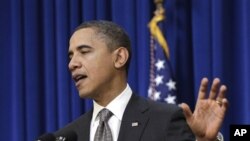In his talks on Tuesday with congressional lawmakers, President Obama reiterated the importance of achieving U.S. Senate ratification of the new nuclear arms reduction treaty with Russia. Reporters asked the president's spokesman about Russian President Dmitry Medvedev's remarks on Tuesday concerning missile defense plans for Europe.
The Russian leader warned of a new weapons race if Russia and NATO are unable to agree on a new missile defense shield for Europe, and spoke of what he called deployment of a new means of attack, without elaborating.
Spokesman Robert Gibbs said that in Obama's meeting with Republican and Democratic congressional leaders, he spoke about great progress made with Moscow on missile defense, which he noted had previously been such a difficult issue in U.S.-Russian relations.
"What had been a contentious issue just several years ago now is part of an agreement with NATO with the cooperation of Russia. I think there has been an acknowledgment that we have made, both parties have had a priority on protecting our friends and allies in Europe and obviously the U.S. and our agreements in Lisbon made concrete years of effort into a missile defense apparatus that provides greater protection for Europe and for the United States," he said.
Gibbs repeated essentially the same answer when asked by a Russian reporter about Russian views, in the wake of agreements announced at the NATO summit in Lisbon, about the ability of the U.S. to be a real partner.
However, asked specifically about President Medvedev's remark about a new Russian strike capability in the event of failure to agree on missile defense arrangements, Gibbs said Russia would have to provide clarification on that.
In his talks with Republican lawmakers, President Obama again pressed for quick approval by the U.S. Senate of the New START nuclear arms reduction treaty with Russia.
Gibbs said Obama made the point that ratification made sense for U.S. national security and relations with Russia, which include Moscow's cooperation on such issues as sanctions against Iran, and North Korea. "Obviously the reduction in deployed nuclear weapons that we all know is a danger, and our efforts in the world to continue to press on Iran and others, like North Korea, for the strongest possible sanctions, how all those efforts work multilaterally," he said.
In his remarks after his meeting with lawmakers on Tuesday, President Obama said he reminded them the New START treaty has already been thoroughly vetted by Congress. "It is absolutely essential to our national security. We need to get it done," he said.
President Obama's spokesman had no immediate detailed response to another question on Tuesday about a Wall Street Journal report saying the U.S. believes Russia has moved short-range tactical nuclear warheads to facilities closer to NATO allies in Europe.
The newspaper quoted U.S. officials as saying the action appeared to run counter to Russian pledges made as early as 1991 to withdraw such weapons from frontier positions and to reduce their numbers.
Gibbs referred to the fact that tactical weapons are not covered under the New START treaty which deals with launchers and deployed deployed missile capabilities.
The initial Wall Street Journal report said there was no immediate official Russian comment on the paper's report. Bloomberg news agency quoted Mikhail Margelov, head of the upper house of the Russian parliament's foreign affairs committee, as dismissing the report.
Obama Presses Lawmakers on New Arms Treaty With Russia




